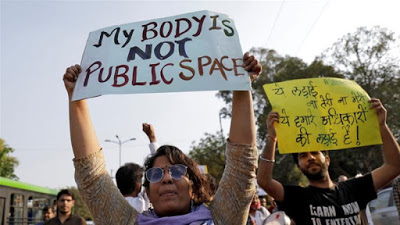India: Mob attacks schoolgirls for confronting sexual harassers
 |
| Zeenat Saberin 08 Oct. 2018 |
Thirty-four girls, aged between 12 and 14, beaten up by boys and their parents in Supaul district.
Campaigners are calling on India to protect girls in state-run institutions who are at risk of sexual assault and violence after 34 girls were violently attacked by a mob for fighting off sexual harassers in Bihar state.
Kasturba Gandhi Balika Vidyalaya, a residential school for girls in Supaul district, witnessed chaotic scenes on Saturday after some girls objected to sexual advances and lewd messages from a group of boys.
A mob comprising the boys and their parents later entered the school where they beat and injured dozens of girls aged between 12 and 14.
“The girls were playing inside the school compound when some boys came in and tried to sexually harass them. The girls fought them off and there was an altercation. A mob then gathered with the boys’ parents who beat up the girls,” Jagatpati Chaudhury, the District Education Officer in Supaul, told Al Jazeera.
“The girls were injured, shocked, in trauma and were rushed to hospital. These were scenes of havoc as most of the girls are in sixth and seventh grades.”
A video uploaded on social media by a local news website, The Bihar Post, showed a girl from the school after the attack.
“They were beating up all the girls. They tore our clothes and took away our dupattas [scarves],” said a young girl who was sobbing at the hospital.
Police say they have arrested two people and detained four in connection with the incident.
District magistrate Baidyanath Yadav said local boys used to write lewd messages on the school walls. Local media reports suggest the girls at the school were routinely harassed.
Schools for India’s poorest
The Kasturba Gandhi Balika Vidyalaya is a special school run by the government that provides residential elementary education to girls belonging to India’s most vulnerable communities: scheduled castes, scheduled tribes, religious minorities and families living below the poverty line across India.
Activists point out that the state and the community have failed to protect girls in such schools, which were set up in places where female rural literacy rates are low.
“This case is especially alarming because it happened at a school. It has been an uphill task to get girls from marginalised communities into schools. In rural Bihar, projects to get adolescent girls on self-defence training programmes have worked very well. So this violent attack is a setback,” Prabhat Kumar, head of child protection at the charity Save the Children in India, told Al Jazeera.
“Shockingly, when the boys came back to attack the girls, they were with their parents. Adults not guiding their children and the community not preventing such attacks is shocking and disheartening,” he added.
‘A child abused every 15 minutes’
A child is sexually abused every 15 minutes in India, according to the NGO, Child Rights.
Violence against girls in Bihar has been in the spotlight since more than 30 girls were raped at a children’s shelter in July, a case that led to national anger over the management of care homes. The girls had told a local court that they were beaten, drugged, raped and scalded with hot water.
India has enacted strident anti-rape laws in response to nationwide outrage in the wake of a series of child rape cases.
The Protection of Children from Sexual Offences (POCSO) Act has been amended to introduce death penalty for the rape of children below the age of 12.
There has been a relentless focus on enabling girls to resist acts of sexual violence.
“Our girls at the school are trained in judo and karate and they gave befitting response to the boys who passed lewd comments. It was only later when the mob arrived that they were beaten up,” said Chaudhury, the government official in Supaul.
According to Child Rights, crime against minors has risen more than 500 percent over the past decade.
In 2016, police in India received 38,947 reports of rape compared with almost 35,000 in 2015, according to data collected by the National Crime Records Bureau.
Campaigners say more needs to be done to protect India’s female children in far-flung areas.
“As a country and a society, we have failed these girls. Stricter vigil needs to be kept about the building walls, guards and other security measures at schools like these,” said Save the Children’s Kumar, who has worked extensively in Bihar.
“Reporting rapes since 2012 has increased but rates of convictions or punishments in cases of sexual violence has had no uptick. This reflects the culture of impunity, the feeling that perpetrators will not be punished,” he added.


